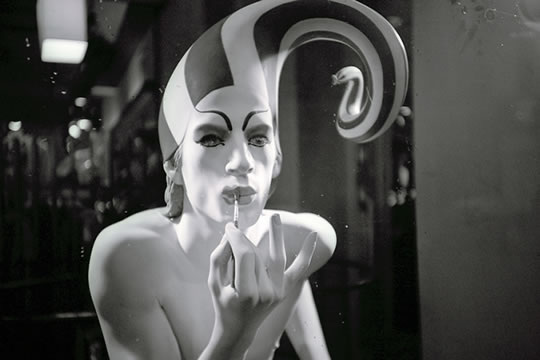Creative people can be a little weird. Great artists are often outsiders: they don't behave like us, they don't look like us and they don't think like us.
True creativity is not the preserve of people who think the same as everyone else. Frequently (but not always) this is the result of lots of weird things happening to them:
"...highly creative individuals often experience a disproportionate number of unusual and unexpected events, such as early parental loss (Martindale, 1972) or having an immigrant status (Goertzel, Goertzel, & Goertzel, 1978). Furthermore, living abroad is linked to creativity in the general population (Leung, Maddux, Galinsky, & Chiu, 2008)." (Ritter et al., 2012)
True creativity is not the preserve of people who think the same as everyone else. Frequently (but not always) this is the result of lots of weird things happening to them:
"...highly creative individuals often experience a disproportionate number of unusual and unexpected events, such as early parental loss (Martindale, 1972) or having an immigrant status (Goertzel, Goertzel, & Goertzel, 1978). Furthermore, living abroad is linked to creativity in the general population (Leung, Maddux, Galinsky, & Chiu, 2008)." (Ritter et al., 2012)
So perhaps:
"...diversifying experiences help people break their cognitive patterns and thus lead them to think more flexibly and creatively." (Ritter et al., 2012)
Now there's experimental support for this idea. In two experiments Ritter et al. found that:
"...comparisons with various control groups showed that a diversifying experience—defined as the active (but not vicarious) involvement in an unusual event—increased cognitive flexibility more than active (or vicarious) involvement in normal experiences."
So go out this weekend and do something weird: it'll make you a more creative person (probably!). As former Beatle Paul McCartney said:
"I used to think anyone doing anything weird was weird. Now I know that it is the people that call others weird that are weird"
Just make sure you take an active part in the weirdness and you don't let the weirdness go too far.
We've all met people who are weird-bad rather than weird-good. A creative person may be intentionally weird, but only at times when weird is good.
Article credit: http://www.spring.org.uk
Image credit: Norma Desmond
"...diversifying experiences help people break their cognitive patterns and thus lead them to think more flexibly and creatively." (Ritter et al., 2012)
Now there's experimental support for this idea. In two experiments Ritter et al. found that:
"...comparisons with various control groups showed that a diversifying experience—defined as the active (but not vicarious) involvement in an unusual event—increased cognitive flexibility more than active (or vicarious) involvement in normal experiences."
So go out this weekend and do something weird: it'll make you a more creative person (probably!). As former Beatle Paul McCartney said:
"I used to think anyone doing anything weird was weird. Now I know that it is the people that call others weird that are weird"
Just make sure you take an active part in the weirdness and you don't let the weirdness go too far.
We've all met people who are weird-bad rather than weird-good. A creative person may be intentionally weird, but only at times when weird is good.
Article credit: http://www.spring.org.uk
Image credit: Norma Desmond


 RSS Feed
RSS Feed

